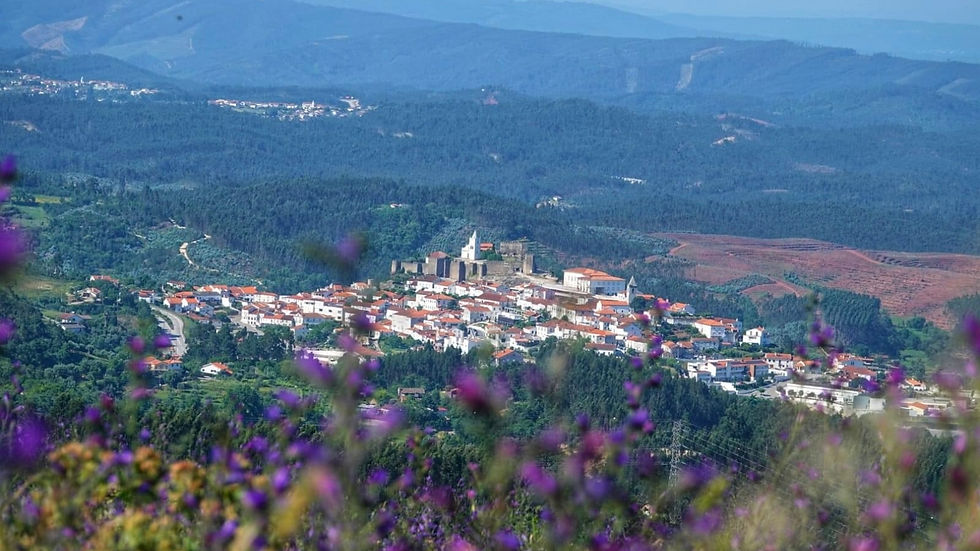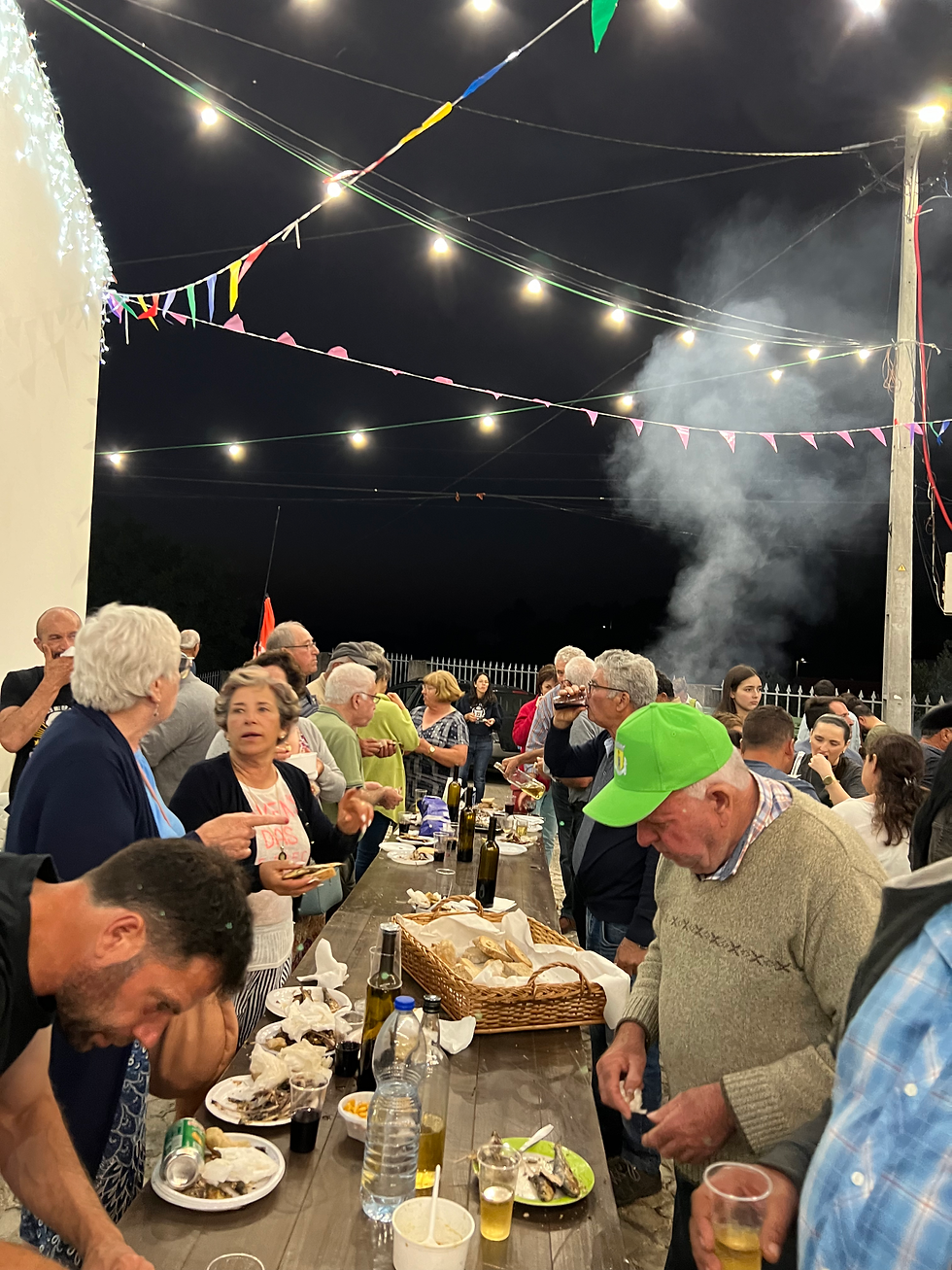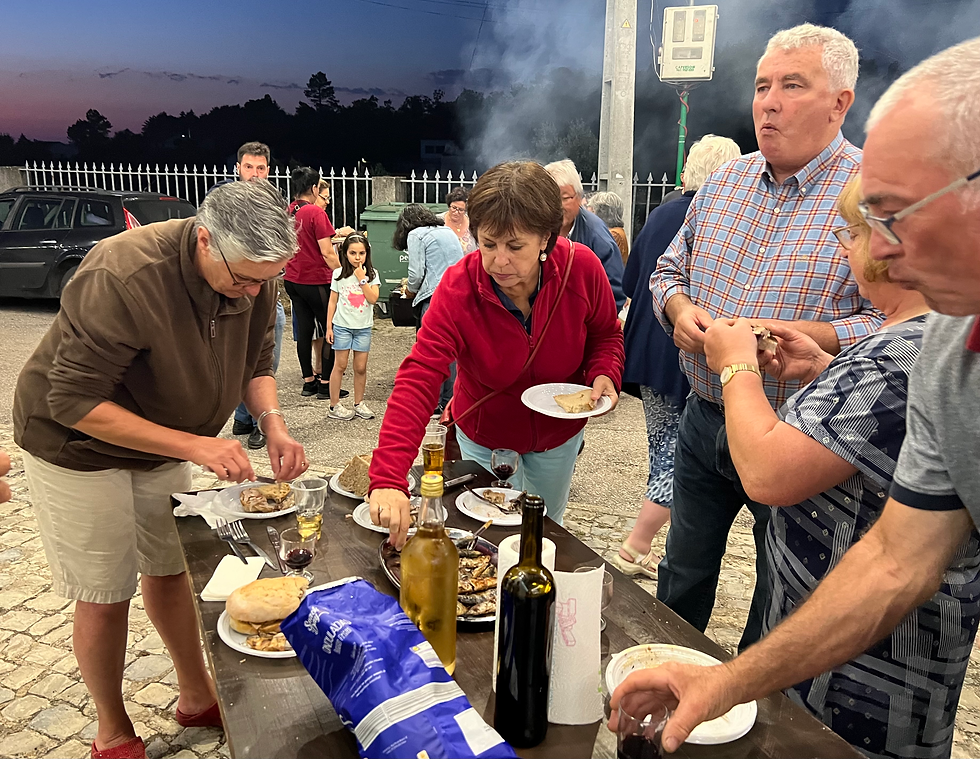
Just to let you know, I wrote this blog before I received the update from the Compensation Round Table Group on Thursday. I thank them for this. In many ways, it was the highlight of my week as we now have seen disclosure and inclusion by the group. I am not going to change my blog at this late stage, as it is only my views, not others.

The second highlight of my week this week was attending the local annual sardine festival. As I informed you a year ago, this involves drinking wine or beer, watching, or if you are stupid enough to participate in Portuguese games, eating copious amounts of sardines cooked at a barbeque, which is free. Friends and neighbours joined us for an enjoyable evening, as can be seen in the pictures. A given is all our clothes went straight into the wash on our return home.
Like many, I read the postings on social media regarding the possibility of compensation for our loss of assets during the Fast Track Land Reform Program (FTLRP) in Zimbabwe launched in 2000. I have always been reluctant to use that term as it had nothing to do with land reform but rather a political ploy to ensure the survival of a despot, therefore allowing his cronies to stay in power and loot the country. Fueled partly by bitterness on Mugabe’s part when it was deemed some of us were supporting the opposition and almost certainly against the British political leadership at the time. Unfortunately, perhaps only for convenience, we white farmers were seen as muBritish by Mugabe, despite most of us being Zimbabwean or of other origin. Mugabe felt dishonoured by the then-current government in the UK, the Labour Party, being snubbed in his futile efforts to raise money for resettlement. We cannot singularly blame Tony Blair and his Secretary of State for International Development, Clare Short, for the events that were to take place in Zimbabwe. Still, they certainly helped fuel the fire despite their ongoing denials. Their lack of interest in our welfare irritated us, while Clare Short’s letter to Minister Kangai in 1997 was just too much for Mugabe to take. The Letter.
It was the part where she wrote due to her background; being Irish made her a colonised individual like him, not a coloniser. This really infuriated him. Not unlike Diane Abbot's recent take on racialism in that due to their colour, the Jews, Irish and Travellers only faced prejudices, not racialism, Mugabe felt much the same about us. Mugabe always said there was no such thing as reverse racialism. In his eyes, he did not see what he did to us as racial yet identified us as whites. I wonder if he felt the same about what he did to the Matabele. Was that tribalism, racialism or political expediency?

Anyway, back to social media. Recently, in one particular forum, the Compensation Awareness Group (CAG), on Telegram, there has been a huge surge in comments, which clearly indicates that although we all have a single goal, there are numerous beliefs on how to achieve this goal. The extreme ends of this argument rope are at one end, the desperate and, in many cases, now elderly or infirm wanting any form of payment, no matter how small or in what form, just that it is immediate, while at the other end, there are those due to circumstance or endeavour, are in a position to be able to wait in expectation for full monetary compensation of their assets including their land. As time has passed, the desperate have become more desperate, and now even those in the middle of these opposing poles, are now becoming more frustrated by lack of progress.
“Extended time with uncertainty combines to bring about great anxiety among an expectant group, resulting in the manifestation of diverse, even entrenched opinions on the best way forward. That is where the TDHs find themselves now.” - Peter McSporran.
As I see it, much of this frustration has been caused by what is known as the Global Compensation Deed (GCD). Despite it being a false promise by a government unlikely to honour it, it has generated hope amongst the ex-farmers (TDHs) to the extent that this hope, in some cases, has become an expectation. The more I think about it, the more I blame the Compensation Steering Committee (CSC) for helping the Government raise this false hope and enshrining it further by pursuing it, without a mandate, even with governments after default. The word capture has been used in the CAG, and I think there is little doubt that some of those in the CSC used their power or influence to capture the Commercial Farmers Union (CFU).
“Once captured, it is exceedingly difficult to regain one's freedom. That is where the CFU finds itself now despite new leadership.” - Peter McSporran
Now we find ourselves with a new president and team in the CFU who has inherited a great amount of baggage and who has to try to regain the trust of the TDHs and represent the demands of the two extremities of these separate but connected poles. The desperate and, for the lack of a better word, the more patient. By the way, being patient does not make you complacent. The trouble now, as I see it, is that the Government is touting the GCD to all and sundry as a done deal while I personally only see it as some have said as window dressing.
“We have been misguided to the extent that we are now being used as a tool against ourselves by being touted as signatories to the now unratified GCD and unsigned FCA. Unbeknown to us, we were captured from within.” - Peter McSporran
Our loyalty and belief that the CFU was representing us ensured our capture. I believe there was a well-laid-out plan, which we were led into, not least because of our desperation. The original promise of a cash payment was the bait. The challenge of the CFU is to try and address all the expectations. The logical thing to do would be to tell the Government and the world that the GCD no longer exists. I doubt this will happen as the CFU is trying to help the desperate, no matter how poor any payment is. Further, one wants to avoid the Government's wrath if you are still farming. This is yet another issue, therefore requiring a very brave leadership if they have something to lose.
“I think it is time the TDH mandated and constituted its own legal entity to represent itself supported if necessary by the CFU allowing it to represent our best interests without the fear or favour that obviously exists at present.” - Peter McSporran
Ridicule from within and from the Government I am sure, but in saying that, it would be a relief to many of us for the return of a concerted effort led and represented by those that have lost the land. Like many, I see no meaningful hope of compensation until there is a democratic government or at least one that is seen as legitimate by the Western world. But for that to happen we need an accurate database, a proven membership. Presently the Government and PROFCA are playing silly buggers with the numbers, are they title deeds or individuals holding title? I am sure the numbers presently quoted on sign up to the FCA by the Government and PROFCA are greatly overstated.
“We have been well played. Our perceived responsibilities, our doubts and our varied ideas on how to cross the try line are stopping us from achieving our common goal.” - Peter McSporran
In saying this, it was interesting that Derrick Arlett Johnson was banned for a period on the GAC for quoting one of the PROFCA board members. Not for the quote, but seemingly for using the board members' identity. On reading the content of what was said, a couple of sentences struck me as warnings against the Farm Compensation Agreement (FCA) under the GCD. I quote the three most notable extracts I perceived as warnings against the FCA. Perhaps I have totally misinterpreted these sentences, but from previous events, I think we all need to be aware of what is said, even if it is inadvertent.
“All Profca members (7 founder members, plus Andy Pascoe) have their title deeds and “have no plans whatsoever” to hand them over.” - attributed to PROFCA board member
Profca did not negotiate; they were (given) an agreement and are/were ‘trying to make it work. Bvumbe is trying to make it stick’. Profca does not ask questions, and “that in itself is the limit of the thought processing(sp)”.- attributed to PROFCA board member
And perhaps the biggest warning:
“GoZ is window dressing for SADC. They want to show that payments have been made (to) improve (their) image with IMF, World Bank, etc.” - attributed to PROFCA board member
As usual, I only air my thoughts and misgivings in the form of ruminations.
Enjoyable but Wasted Trip to the World Economic Forum in Cape Town in 1994.
In 1994, the CFU, along with other business organisations in Zimbabwe, was invited to attend the World Economic Forum, which that year was held in Cape Town. It was also the same year Mandela became president of South Africa, having won the first post-apartheid election in May of that year. He would be the star of the show. Much to Mugabe's chagrin, South Africa was the new blue-eyed boy on the block in Africa.
For those that do not know, the World Economic Forum, based out of Davros, brings the world's leaders in the private and public sectors together to discuss world economic matters. Its stated mission is:
"Improving the state of the world by engaging business, political, academic, and other leaders of society to shape global, regional, and industry agendas."
To be honest, with hindsight, it is a forum for the rich, politicos and those politically connected to network and inflate each other's egos. Despite this, it has a huge influence, so the CFU, in its wisdom, decided to send me as their representative. I do not remember all the delegates from Zimbabwe. I know Mugabe was in attendance but cannot remember him speaking; I do remember Mandela and Chissano along with the then Minister of Finance, Bernard Chidzero and, more importantly, my social companions at the event, Bill Moore representing CZI and Alistair Smith, my long-time friend as a private citizen. Bernard Chidzero resigned or was stood down in 1995 as the Zimbabwean Minister of Finance. I sometimes wonder if he would have better advised Mugabe on the stupidity of printing billions to pay the war vets in 1997. Maybe he knew it would come and got out before the disaster unfolded. He had watched over our economy fairly successfully for nearly thirteen years. I also remember that Matebele business stalwart Eric Bloch also in attendance, not quite with the same exuberance as Bill, Alistair and myself in enjoying the side visits, including one to Stellenbosch, the highlight there being a dinner in the KWV wine cellars. We thought we had died and arrived in heaven. I do remember the coach trip back to Cape Town, all, including the ‘hoity-toit’ were well drunk. The now late Bill Moore was a clever, straight-talking gentleman despite being a reprobate when imbibing too much red wine. He and I would often get together in the future, whether at a private social meal or a ‘compulsory to attend’ event, turning the latter into enjoyable affairs through humour and comradery.
Duty-bound, we attended all the important presentations and attended all those given by Zimbabweans. Question and answer sessions were the most productive. Unsurprisingly, all the politico's speeches were aimed at placating their own business leaders and attracting outside investment. It has always intrigued me that despite African politicians' irresponsible policies, actions and misrule, they all believe lies will convince investors to come to their country.

The meetings were held at the Mount Nelson Hotel, and upon checking with Alistair, we confirmed it was well beyond our means; therefore, we were staying at a cheaper hostelry nearby. Needless to say, we did attend the final banquet, and each table would have a celebrity host. Ours was Lou Dobbs, a CNN news anchorman at the time. The food was pretty awful, but his stories about world leaders and celebrities were interesting.
I suppose I must concede that as a networking exercise, it was a success, but to be honest, nobody was really interested in the expectations and dreams of the future of a lowly Zimbabwean farmer. On returning, we were offered a return invitation to attend the next conference at normal rates; we would have had to sell Agricultural House to attend. I, therefore, think that may have been the first and last World Economic Forum the CFU officially attended.
Disclaimer: Copyright Peter McSporran. The content in this blog represents my personal views and does not reflect corporate entities.
Comments